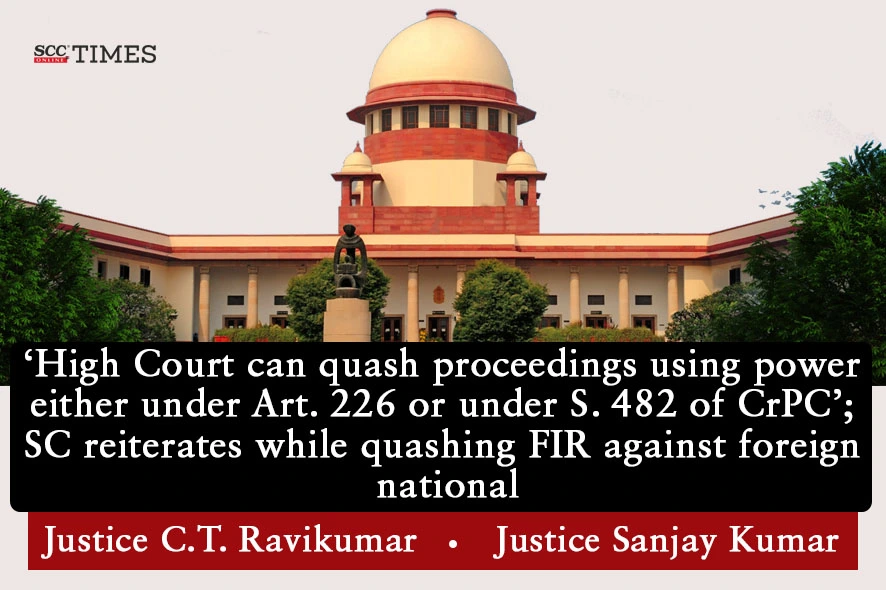Supreme Court: In a criminal appeal against a decision of Allahabad High Court, refusing to quash the First Information Report (FIR), the Division Bench of CT Ravikumar and Sanjay Kumar, JJ. held that the High Court erred in refusing to quash the FIR, as the FIR did not disclose the commission of the offence as alleged. The Bench added that besides the vague allegations, the rest of them, even if taken as true, did not disclose the commission of any offence and made out a case against, the present accused. Thus, allowing the appeal, the Court set aside the impugned decision along with the subject FIR.
Factual Matrix
Hyundai Motor India Limited (‘HMIL’) awarded a contract for the construction and development of a project namely, Gurgaon, HMI Project, R.C. Works (‘the project’) to Hyundai Engineering & Construction India LLP (‘HEC India LLP’). The present appellant was the Project Manager of HEC India LLP and is a foreign national. HEC India LLP, sub-contracted the work to KOTEC Automotive Services India Private Limited (‘KOTEC’) which in turn sub-contracted the constructions work to YSSS India Construction (‘YSSS’) and ‘YSSS’ further sub-contracted with R.T. Construction, which is the complainant’s entity, to obtain manpower. It was alleged that ‘YSSS’ in connivance with the other accused defaulted payment to the company to the tune of Rs.9 Crores to the complainant’s company. FIR was registered under Sections 406, 420, 323, 504, 506 and 120-B of the Penal Code, 1860 (‘the IPC’).
The present appellant- accused approached the High Court seeking quashing of the FIR, which came to be dismissed.
Analysis and Decision
The Court reiterated that the High Court could exercise its power of judicial review in criminal matters and it could exercise this power either under Article 226 of the Constitution or under Section 482 of the CrPC to prevent abuse of the process of the Court or to secure the ends of justice. Furthermore, it was held that the exercise of that power would depend upon the facts and circumstances of each case.
The Court noted that in State of Haryana v. Bhajan Lal, 1992 Supp (1) SCC 335 it was held that it might not be possible to lay down any precise, clearly defined and sufficiently channelised and inflexible guidelines or rigid formula and exhaustive list of myriad kinds of cases wherein such power should be exercised and encapsulate the following cases falling under such categories.
The Court relied upon State of A.P. v. Golconda Linga Swamy, (2004) 6 SCC 522, wherein, it was held that where an FIR did not disclose the commission of an offence without anything being added or subtracted from the recitals thereof, the said FIR could be quashed. Perusing the subject FIR, the Court said that despite microscopic examination of the allegations raised, except some vague allegations, no specific allegation was made against the accused herein or against the company ‘HEC India LLP’ wherein he was the Project Manager.
The Court also noted that after making some allegations, the complainant sought for registration of a case against the persons named therein, including the present accused to help the complainant herein to recover the amount mentioned. The Court added that the allegations therein would reveal that the complaint of committing default in payment of an amount around Rs.9 Crores was not made against the appellant herein or against the company in which he was the Project Manager, whereas it was made against a different company/different companies.
Hence, placing reliance upon Mohammad Wajid v. State of U.P., 2022 SCC OnLine SC 2048, wherein it was held that- it will not be just enough for the Court to look into the averments made in the FIR/complaint alone for the purpose of ascertaining whether the necessary ingredients to constitute the alleged offence are disclosed or not. In frivolous or vexatious proceedings, the Court owes a duty to look into many other attending circumstances emerging from the record of the case over and above the averments and, if need be, with due care and circumspection try to read in between the lines, the Court held that the High Court erred in refusing to exercise the extraordinary power under Article 226 of the Constitution of India to quash the subject FIR and all further proceedings in pursuance thereof, qua the accused.
CASE DETAILS
|
Citation: Appellants : Respondents : |
Advocates who appeared in this case For Petitioner(s): For Respondent(s): |
CORAM :












Party in person latur in High court of Bombay bench at Aurangabad.